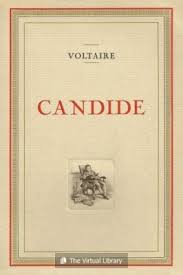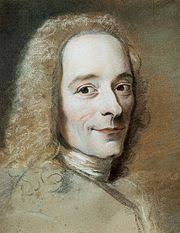Candide
Candide, ou l'Optimisme, is a French satire first published in 1759 by Voltaire, a philosopher of the Age of Enlightenment.
I HOW CANDIDE WAS BROUGHT UP IN A MAGNIFICENT CASTLE, AND HOW HE WAS EXPELLED THENCE. In a castle of Westphalia, belonging to the Baron of Thunder-ten-Tronckh, lived a youth, whom nature had endowed with the most gentle manners. His countenance was a true picture of his soul. He combined a true judgment with simplicity of spirit, which was the reason, I apprehend, of his being called Candide. The old servants of the family suspected him to have been the son of the Baron's sister, by a good, honest gentleman of the neighborhood, whom that young lady would never marry because he had been able to prove only seventy-one quarterings, the rest of his genealogical tree having been lost through the injuries of time. The Baron was one of the most powerful lords in Westphalia, for his castle had not only a gate, but windows. His great hall, even, was hung with tapestry. All the dogs of his farm-yards formed a pack of hounds at need; his grooms were his huntsmen; and the curate of the village was his grand almoner. They called him "My Lord," and laughed at all his stories. The Baron's lady weighed about three hundred and fifty pounds, and was therefore a person of great consideration, and she did the honours of the house with a dignity that commanded still greater respect. Her daughter Cunegonde was seventeen years of age, fresh-coloured, comely, plump, and desirable. The Baron's son seemed to be in every respect worthy of his father. The Preceptor Pangloss[1] was the oracle of the family, and little Candide heard his lessons with all the good faith of his age and character. Pangloss was professor of metaphysico-theologico-cosmolo-nigology. He proved admirably that there is no effect without a cause, and that, in this best of all possible worlds, the Baron's castle was the most magnificent of castles, and his lady the best of all possible Baronesses. "It is demonstrable," said he, "that things cannot be otherwise than as they are; for all being created for an end, all is necessarily for the best end. Observe, that the nose has been formed to bear spectacles--thus we have spectacles. Legs are visibly designed for stockings--and we have stockings. Stones were made to be hewn, and to construct castles--therefore my lord has a magnificent castle; for the greatest baron in the province ought to be the best lodged. Pigs were made to be eaten--therefore we eat pork all the year round. Consequently they who assert that all is well have said a foolish thing, they should have said all is for the best." Candide listened attentively and believed innocently; for he thought Miss Cunegonde extremely beautiful, though he never had the courage to tell her so. He concluded that after the happiness of being born of Baron of Thunder-ten-Tronckh, the second degree of happiness was to be Miss Cunegonde, the third that of seeing her every day, and the fourth that of hearing Master Pangloss, the greatest philosopher of the whole province, and consequently of the whole world. One day Cunegonde, while walking near the castle, in a little wood which they called a park, saw between the bushes, Dr. Pangloss giving a lesson in experimental natural philosophy to her mother's chamber-maid, a little brown wench, very pretty and very docile. As Miss Cunegonde had a great disposition for the sciences, she breathlessly observed the repeated experiments of which she was a witness; she clearly perceived the force of the Doctor's reasons, the effects, and the causes; she turned back greatly flurried, quite pensive, and filled with the desire to be learned; dreaming that she might well be a sufficient reason for young Candide, and he for her. She met Candide on reaching the castle and blushed; Candide blushed also; she wished him good morrow in a faltering tone, and Candide spoke to her without knowing what he said. The next day after dinner, as they went from table, Cunegonde and Candide found themselves behind a screen; Cunegonde let fall her handkerchief, Candide picked it up, she took him innocently by the hand, the youth as innocently kissed the young lady's hand with particular vivacity, sensibility, and grace; their lips met, their eyes sparkled, their knees trembled, their hands strayed. Baron Thunder-ten-Tronckh passed near the screen and beholding this cause and effect chased Candide from the castle with great kicks on the backside; Cunegonde fainted away; she was boxed on the ears by the Baroness, as soon as she came to herself; and all was consternation in this most magnificent and most agreeable of all possible castles. II WHAT BECAME OF CANDIDE AMONG THE BULGARIANS. Candide, driven from terrestrial paradise, walked a long while without knowing where, weeping, raising his eyes to heaven, turning them often towards the most magnificent of castles which imprisoned the purest of noble young ladies. He lay down to sleep without supper, in the middle of a field between two furrows. The snow fell in large flakes. Next day Candide, all benumbed, dragged himself towards the neighbouring town which was called Waldberghofftrarbk-dikdorff, having no money, dying of hunger and fatigue, he stopped sorrowfully at the door of an inn. Two men dressed in blue observed him. "Comrade," said one, "here is a well-built young fellow, and of proper height." They went up to Candide and very civilly invited him to dinner. "Gentlemen," replied Candide, with a most engaging modesty, "you do me great honour, but I have not wherewithal to pay my share." "Oh, sir," said one of the blues to him, "people of your appearance and of your merit never pay anything: are you not five feet five inches high?" "Yes, sir, that is my height," answered he, making a low bow. "Come, sir, seat yourself; not only will we pay your reckoning, but we will never suffer such a man as you to want money; men are only born to assist one another." "You are right," said Candide; "this is what I was always taught by Mr. Pangloss, and I see plainly that all is for the best." They begged of him to accept a few crowns. He took them, and wished to give them his note; they refused; they seated themselves at table. "Love you not deeply?" "Oh yes," answered he; "I deeply love Miss Cunegonde." "No," said one of the gentlemen, "we ask you if you do not deeply love the King of the Bulgarians?" "Not at all," said he; "for I have never seen him." "What! he is the best of kings, and we must drink his health." "Oh! very willingly, gentlemen," and he drank. "That is enough," they tell him. "Now you are the help, the support, the defender, the hero of the Bulgarians. Your fortune is made, and your glory is assured." Instantly they fettered him, and carried him away to the regiment. There he was made to wheel about to the right, and to the left, to draw his rammer, to return his rammer, to present, to fire, to march, and they gave him thirty blows with a cudgel. The next day he did his exercise a little less badly, and he received but twenty blows. The day following they gave him only ten, and he was regarded by his comrades as a prodigy.
Translation
Translate and read this book in other languages:
Select another language:
- - Select -
- 简体中文 (Chinese - Simplified)
- 繁體中文 (Chinese - Traditional)
- Español (Spanish)
- Esperanto (Esperanto)
- 日本語 (Japanese)
- Português (Portuguese)
- Deutsch (German)
- العربية (Arabic)
- Français (French)
- Русский (Russian)
- ಕನ್ನಡ (Kannada)
- 한국어 (Korean)
- עברית (Hebrew)
- Gaeilge (Irish)
- Українська (Ukrainian)
- اردو (Urdu)
- Magyar (Hungarian)
- मानक हिन्दी (Hindi)
- Indonesia (Indonesian)
- Italiano (Italian)
- தமிழ் (Tamil)
- Türkçe (Turkish)
- తెలుగు (Telugu)
- ภาษาไทย (Thai)
- Tiếng Việt (Vietnamese)
- Čeština (Czech)
- Polski (Polish)
- Bahasa Indonesia (Indonesian)
- Românește (Romanian)
- Nederlands (Dutch)
- Ελληνικά (Greek)
- Latinum (Latin)
- Svenska (Swedish)
- Dansk (Danish)
- Suomi (Finnish)
- فارسی (Persian)
- ייִדיש (Yiddish)
- հայերեն (Armenian)
- Norsk (Norwegian)
- English (English)
Citation
Use the citation below to add this book to your bibliography:
Style:MLAChicagoAPA
"Candide Books." Literature.com. STANDS4 LLC, 2025. Web. 22 Feb. 2025. <https://www.literature.com/book/candide_25>.








Discuss this Candide book with the community:
Report Comment
We're doing our best to make sure our content is useful, accurate and safe.
If by any chance you spot an inappropriate comment while navigating through our website please use this form to let us know, and we'll take care of it shortly.
Attachment
You need to be logged in to favorite.
Log In